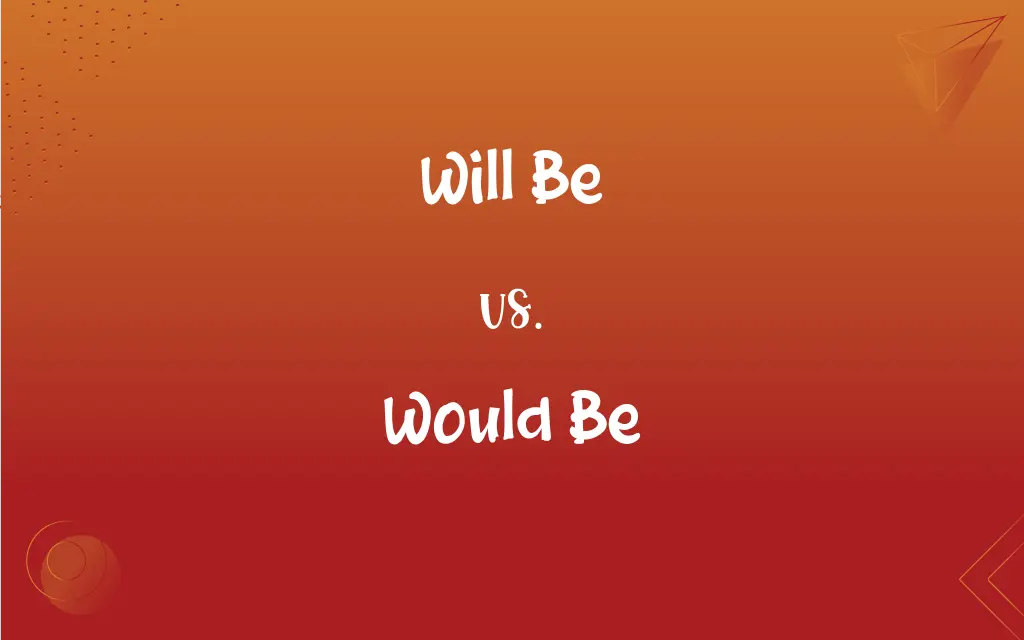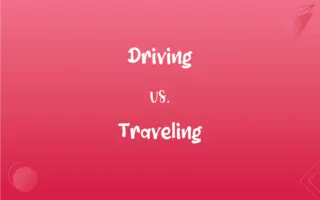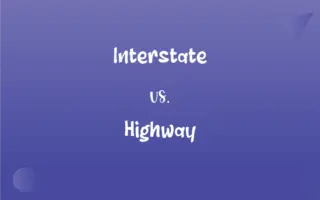Will Be vs. Would Be: What's the Difference?
Edited by Aimie Carlson || By Harlon Moss || Published on December 2, 2023
Will be indicates a future action or event that is certain or planned. Would be implies a conditional or hypothetical situation, often used in speculative or imaginary contexts.

Key Differences
Will be is used to express a definitive future action or state, suggesting certainty or intention, whereas would be is used in conditional or hypothetical statements, often dependent on another condition.
Will be conveys a sense of future commitment or plan, as in scheduling or promising future events, whereas would be often implies speculation or potentiality, used in scenarios that are not guaranteed to occur.
In terms of tense, will be is a simple future tense form, indicating actions that are expected to happen, while would be is a conditional tense, used for imagined, hypothetical, or unfulfilled actions or states.
Will be is often found in contexts of predictions, future plans, or scheduled events, showing a level of confidence, while would be is frequently used in polite requests, hypothetical scenarios, or to express a desire or wish.
The use of will be generally involves more direct and factual statements about the future, whereas would be tends to create a sense of doubt, politeness, or hypothetical reasoning.
ADVERTISEMENT
Comparison Chart
Usage
Indicates certainty or intention for future events.
Used in conditional or hypothetical scenarios.
Example Context
Predictions, schedules, future plans.
Speculative, imaginary, or polite requests.
Tense
Simple future tense.
Conditional tense.
Implication
Conveys a sense of commitment or planning.
Implies potentiality or speculation.
Tone
More direct and factual about the future.
Often softer, suggesting doubt or courtesy.
ADVERTISEMENT
Will Be and Would Be Definitions
Will Be
Indicates future actions in a planned or scheduled manner.
She will be traveling to New York next month.
Would Be
Used to express a hypothetical situation in the future.
I would be happy to attend if I were free.
Will Be
Implies a future state of being or condition.
It will be sunny tomorrow.
Would Be
Indicates a conditional future event, often depending on another factor.
It would be easier to finish the project with more resources.
Will Be
Used for making future predictions.
They will be successful in their new venture.
Would Be
Often used in polite requests or offers.
Would you be willing to help me with this?
Will Be
Used to express a future event that is certain to happen.
The meeting will be at 10 AM tomorrow.
Would Be
Implies an imagined or speculative future scenario.
If I won the lottery, I would be traveling the world.
Will Be
Shows a future intention or decision.
He will be completing his project by Friday.
Would Be
Suggests a potential future state under different circumstances.
Without the rain, it would be a perfect day for a picnic.
Would Be
Desiring, attempting, or professing to be
"Would-be home buyers will have a somewhat easier time getting loans" (Wall Street Journal).
Would Be
Attempting or desiring something.
Would-be marines have to get through a rigorous examination.
Would Be
Unfulfilled; frustrated in realizing a goal, ambition, etc.
Would-be film stars often become waitresses.
Would Be
One who aspires to something.
Would Be
(India) One's fiancé or fiancée.
Would Be
Desiring or professing to be; vainly pretending to be; as, a would-be poet.
Would Be
Seeking advancement or recognition
Would Be
Unfilled or frustrated in realizing an ambition
FAQs
Can "will be" express certainty?
Yes, "will be" often expresses a high degree of certainty about a future event.
How does "will be" function in a sentence?
"Will be" is used as a future tense auxiliary verb, indicating actions or states in the future.
Can "would be" express a future in the past?
Yes, it's used to talk about something that was possible or expected in the past.
Can "would be" imply politeness?
Yes, "would be" is often used to make polite requests or statements.
Can "would be" be used to express willingness?
Yes, particularly in response to questions or requests, like in, "I would be happy to help."
Is "will be" appropriate for making promises?
Yes, "will be" is often used to make promises about future actions.
What is the main difference between "will be" and "would be"?
"Will be" is used for future predictions or plans, while "would be" is used for hypothetical situations or conditions.
Is "would be" used for past tense situations?
"Would be" is not past tense itself, but it can be used to talk about hypothetical situations in the past.
What is an example of "will be" in a sentence?
"She will be arriving at 10 am."
What is an example of "would be" in a sentence?
"It would be great if you could join us."
Is "will be" used in conditional sentences?
"Will be" is used in the main clause of Type 1 conditional sentences, indicating a likely future result.
How does context affect the meaning of "will be"?
The meaning can vary based on context, ranging from predictions to scheduled events or intentions.
Can "will be" be used in questions?
Yes, for future-oriented questions, like, "Will you be attending the meeting?"
Can "will be" indicate a state as well as an action?
Yes, it can refer to both future actions and states, like, "Tomorrow will be sunny."
Can "would be" be used for making suggestions?
Yes, it's often used to suggest hypothetical actions, like in, "It would be better to leave early."
How does "would be" interact with other modal verbs?
It can be used after verbs like "think" or "hope" to express conjecture or speculation, like, "I think it would be a good idea."
Is "would be" used in indirect speech?
Yes, especially when reporting past statements about the future, like in, "She said she would be late."
Does "will be" always refer to a specific time in the future?
Not necessarily. While it often indicates a specific future time, it can also be used more generally.
What role does "would be" play in polite inquiries?
It softens the tone, making requests or inquiries more polite, as in, "Would you be able to assist?"
Can "would be" be used with past unreal conditions?
Yes, it's commonly used in the main clause of Type 2 and 3 conditional sentences.
About Author
Written by
Harlon MossHarlon is a seasoned quality moderator and accomplished content writer for Difference Wiki. An alumnus of the prestigious University of California, he earned his degree in Computer Science. Leveraging his academic background, Harlon brings a meticulous and informed perspective to his work, ensuring content accuracy and excellence.
Edited by
Aimie CarlsonAimie Carlson, holding a master's degree in English literature, is a fervent English language enthusiast. She lends her writing talents to Difference Wiki, a prominent website that specializes in comparisons, offering readers insightful analyses that both captivate and inform.






































































